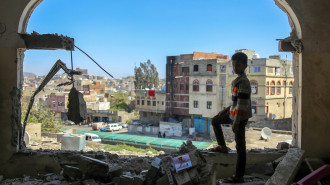Special documentary - Tunisia: The phosphate curse
At the heart of the uprising that began on 17 December 2010 was chronic marginalisation and underdevelopment.
That uprising may have been triggered by the self-immolation of Mohammed Bouazizi in Sidi Bouzid, but the underlying causes were closely linked to the 2008 uprising in another centre-west region, Gafsa.
| Going underground in Gafsa | |
|
Gafsa is a region rich in phosphate ore, located in south-west Tunisia close to the Algerian border. It has been marginalised and exploited by successive governments, but its people have a long tradition of resistance. 26-27 January 1980 - The 'Gafsa Armed Uprising' against Bourguiba is launched by trade unionists and participants of the failed 1962 coup in response to Bourguiba's dictatorial neo-liberal policies. Hundreds of unionists and Islamists had been imprisoned two years earlier. 5 January 2008 – The 'rebellion of the people of the mines' triggered when Gafsa Phosphate Company announced a hiring contest for 380 workers. Tunisia's adoption of an IMF-imposed structural adjustment plan led to a 75 percent drop in personnel at the mine. 6 January 2009 – A small group of trade union activists defy national leadership to set up a negotiation committee. 11 December 2009 – Trade union leaders sentenced to 10 years in jail. The movement was suppressed, but Gafsa became a central player in the revolt against Ben Ali's authoritarian regime. Its citizens still fight for social justice and political freedom. |
We return to the town of Redeyef, in Gafsa, where people say they still have little to show for all the mineral wealth that lies beneath the soil. The town has come to symbolise the failure and injustice of Tunisia's post-independence development model.
The uprising might have given birth to democracy in the country, but most of the inhabitants of Redeyef are still unemployed. And far from seeing their situation improve, many are sick or dying from health problems they say are caused by the state-owned phosphate mining industry.
There have never been any studies into the health impact of the phosphate mines here, despite disturbingly high rates of cancer, bone and respiratory ailments.
The overwhelming majority of people in Redeyef also suffer dental fluorosis.
Will tackling these issues be high on the agenda of the new parliament, or will the decades of neglect continue?
Watch our exclusive 12-minute documentary below.



